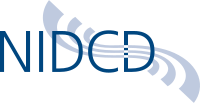
National Institute on Deafness and Other Communication Disorders
Encyclopedia

Hearing (sense)
Hearing is the ability to perceive sound by detecting vibrations through an organ such as the ear. It is one of the traditional five senses...
, balance
Balance (ability)
In biomechanics, balance is an ability to maintain the center of gravity of a body within the base of support with minimal postural sway. When exercising the ability to balance, one is said to be balancing....
, smell
Olfaction
Olfaction is the sense of smell. This sense is mediated by specialized sensory cells of the nasal cavity of vertebrates, and, by analogy, sensory cells of the antennae of invertebrates...
, taste
Taste
Taste is one of the traditional five senses. It refers to the ability to detect the flavor of substances such as food, certain minerals, and poisons, etc....
, voice
Human voice
The human voice consists of sound made by a human being using the vocal folds for talking, singing, laughing, crying, screaming, etc. Its frequency ranges from about 60 to 7000 Hz. The human voice is specifically that part of human sound production in which the vocal folds are the primary...
, speech, and language
Language
Language may refer either to the specifically human capacity for acquiring and using complex systems of communication, or to a specific instance of such a system of complex communication...
. The Institute also conducts and supports research and research training related to disease prevention and health promotion; addresses special biomedical and behavioral problems associated with people who have communication impairments or disorders; and supports efforts to create devices which substitute for lost and impaired sensory and communication function.
The current director of the NIDCD is Dr. James F. Battey, Jr. Dr. Battey is a Caltech graduate with PhD and an MD from Stanford.
Differing from some other institutes, in 1999 the NIDCD discontinued the Multi-Purpose Research and Training Center funding mechanism (large center grants) for the entire institute focusing instead on single-project research awards (R01's).

